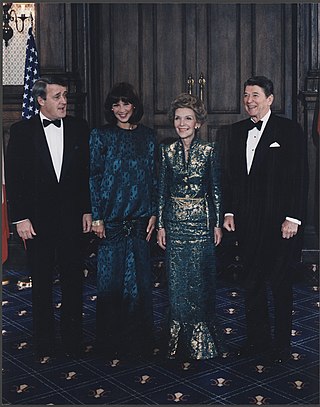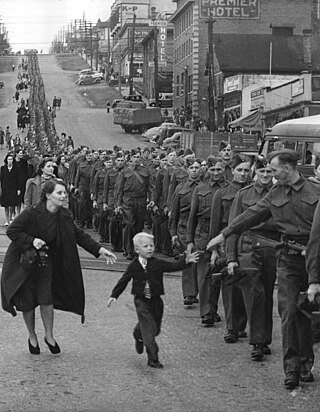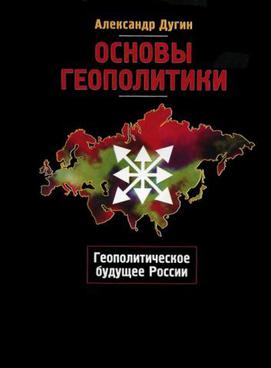
Canada's long and complex relationship with the United States has had a significant impact on its history, economy, and culture. The two countries consider themselves among the "closest [of] allies". They share the longest border between any two nations in the world, and also have significant military interoperability. Both Americans and Canadians have generally ranked each other as one of their respective "favorite nations". Canadian peacekeeping is deeply embedded in Canadian culture and a distinguishing feature that Canadians feel sets their foreign policy apart from the United States. Canadian Anti-Americanism manifests itself in a variety of ways, ranging from political, to cultural.

William Lyon Mackenzie King was a Canadian statesman and politician who was the tenth prime minister of Canada for three non-consecutive terms from 1921 to 1926, 1926 to 1930, and 1935 to 1948. A Liberal, he was the dominant politician in Canada from the early 1920s to the late 1940s. King is best known for his leadership of Canada throughout the Great Depression and the Second World War. He played a major role in laying the foundations of the Canadian welfare state and established Canada's international reputation as a middle power fully committed to world order. With a total of 21 years and 154 days in office, he remains the longest-serving prime minister in Canadian history.

The foreign relations of Canada are Canada's relations with other governments and nations. Canada is recognized as a middle power for its role in international affairs with a tendency to pursue multilateral and international solutions. Canada's foreign policy based on international peacekeeping and security is carried out through coalitions, international organizations, and the work of numerous federal institutions. The strategy of the Canadian government's foreign aid policy reflects an emphasis to meet the Sustainable Development Goals, while also providing assistance in response to foreign humanitarian crises. The Canadian Security Intelligence Service (CSIS) is tasked with gathering and analyzing intelligence to prevent threats such as terrorism, espionage, and foreign interference, while the Communications Security Establishment (CSE) is focused on cyber security and protecting Canada's digital infrastructure.
Jack Lawrence Granatstein is a Canadian historian who specializes in Canadian political and military history.
David Jay Bercuson is a Canadian labour, military, and political historian.

The Shamrock Summit was the colloquial name given to the March 17–18, 1985 meeting between Canadian Prime Minister Brian Mulroney and US President Ronald Reagan in Quebec City. It gained this nickname because of the Irish background of the two leaders and because the meeting started on St. Patrick's Day. The summit was capped by a televised gala, which ended with Mulroney, Reagan and their wives singing "When Irish Eyes Are Smiling", which publicly exemplified the camaraderie between the two leaders.
George Norman Hillmer is a Canadian historian and is among the leading scholars on Canada–US relations.

During the World Wars and Interwar Years, 1914–1947, Canada experienced economic gain, more freedom for women, and new technological advancements. There were severe political tensions over issues of war and ethnicity, and heavy military casualties. The Great Depression hit Canada hard, especially in export-oriented mining and farming communities, and in urban factory districts.

Prosperity returned to Canada during the Second World War. With continued Liberal governments, national policies increasingly turned to social welfare, including universal health care, old-age pensions, and veterans' pensions.

This is a bibliography of major works on the History of Canada.

Canada has been a member of the North Atlantic Treaty Organization (NATO) since its inception in 1949.

Canada and Germany have positive relations, as they are close allies and fellow NATO and G7 members.

Who Killed the Canadian Military? is a 2004 non-fiction book by J. L. Granatstein, a Canadian historian and military veteran. It examines and critiques the dilapidated state of the Canadian military. It also argues that a well-funded and well-trained military is necessary, given the then current international climate, and that increased military spending is necessary for Canada to survive as a nation. The book received mainly positive reviews from both the Canadian Military Journal and H-Net.

The Foundations of Geopolitics: The Geopolitical Future of Russia is a geopolitical book by Aleksandr Dugin. Its publication in 1997 was well received in Russia; it has had significant influence within the Russian military, police, and foreign policy elites, and has been used as a textbook in the Academy of the General Staff of the Russian military. Powerful Russian political figures subsequently took an interest in Dugin, a Russian political analyst who espouses an ultranationalist and neo-fascist ideology based on his idea of neo-Eurasianism, who has developed a close relationship with Russia's Academy of the General Staff.

The historiography of Canada deals with the manner in which historians have depicted, analyzed, and debated the history of Canada. It also covers the popular memory of critical historical events, ideas and leaders, as well as the depiction of those events in museums, monuments, reenactments, pageants and historic sites.

The Dorchester Review, founded in 2011, is a semi-annual journal of history and historical commentary that describes itself as a non-partisan but "robustly polemical" outlet for "elements of tradition and culture inherent to Canadian experience that fail to conform to a stridently progressivist narrative."

Who Killed Canadian History? is a 1998 book by Canadian historian J. L. Granatstein. The book argues that Canadians lack national unity because of their failure to teach their country's history. Granatstein contends that multiculturalism, social historians and weak history teaching standards are responsible for Canada's lack of a historical narrative. He advocates for a greater emphasis on the study of Canadian history in schools and university history departments, especially political and military history.
The foreign policies of Canada and its predecessor colonies were under British control until the 20th century. This included wars with the United States in 1775-1783 and 1812–1815. Economic ties with the U.S. were always close. Political tensions arose in the 19th century from anti-British sentiment in the U.S. in the 1860s. Boundary issues caused diplomatic disputes resolved in the 1840s over the Maine boundary. and early 1900s, in the early 20th century over the Alaska boundary. There is ongoing discussion regarding the Arctic. Canada-US relations have been friendly in the 20th and 21st centuries.












